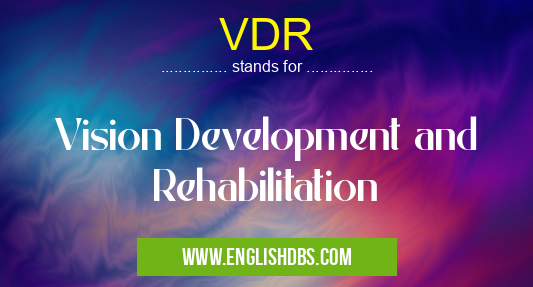What does VDR mean in REHABILITATION
VDR stands for Vision Development and Rehabilitation. It is a specialized field of ophthalmology that focuses on the assessment and management of vision problems in both children and adults. VDR professionals work with patients of all ages to improve their visual function and overall quality of life.

VDR meaning in Rehabilitation in Medical
VDR mostly used in an acronym Rehabilitation in Category Medical that means Vision Development and Rehabilitation
Shorthand: VDR,
Full Form: Vision Development and Rehabilitation
For more information of "Vision Development and Rehabilitation", see the section below.
What is VDR?
VDR professionals are trained to assess and diagnose a wide range of vision problems, including:
- Amblyopia (lazy eye)
- Strabismus (crossed eyes)
- Nystagmus (involuntary eye movements)
- Refractive errors (nearsightedness, farsightedness, and astigmatism)
- Developmental vision disorders
- Visual field defects
- Ocular motility disorders
VDR professionals also provide rehabilitation services to help patients with vision impairments maximize their visual function. These services may include:
- Vision therapy
- Low vision aids
- Orientation and mobility training
- Independent living skills training
Essential Questions and Answers on Vision Development and Rehabilitation in "MEDICAL»REHABILITATION"
What is Vision Development and Rehabilitation (VDR)?
VDR is a specialized field that focuses on the assessment and management of visual disorders and disabilities. It involves providing comprehensive eye care services, including vision therapy, low vision rehabilitation, and occupational therapy.
Who can benefit from VDR services?
Individuals of all ages with a wide range of visual impairments can benefit from VDR services. This includes people with conditions such as strabismus (crossed eyes), amblyopia (lazy eye), developmental vision disorders, visual field loss, and age-related macular degeneration.
What types of services are offered through VDR?
VDR services typically include:
- Comprehensive eye examinations
- Vision therapy to improve eye coordination and visual processing
- Low vision rehabilitation to enhance visual function for individuals with permanent vision loss
- Occupational therapy to help individuals adapt to their visual impairments and improve daily living skills
- Assistive technology recommendations and training
- Referral to other specialists as needed
How do I know if I need VDR services?
If you are experiencing any vision problems or have been diagnosed with a visual impairment, consulting with an eye care professional is recommended. They can assess your vision and determine if VDR services would be beneficial for you.
What are the benefits of VDR services?
VDR services can provide numerous benefits, including:
- Improved visual function and reduced eye strain
- Enhanced spatial awareness and balance
- Increased self-confidence and independence
- Improved reading and learning abilities
- Reduced risk of accidents and falls
Final Words: VDR is an important field of ophthalmology that provides essential services to patients with vision problems. VDR professionals are highly trained and experienced in assessing and managing a wide range of vision disorders, and they can provide rehabilitation services to help patients achieve their full potential.
